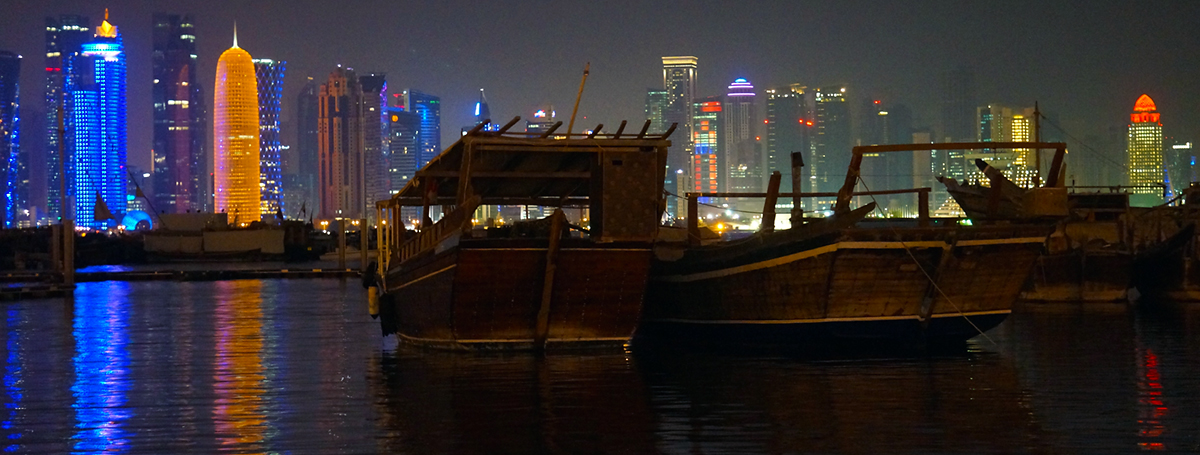The Pink City
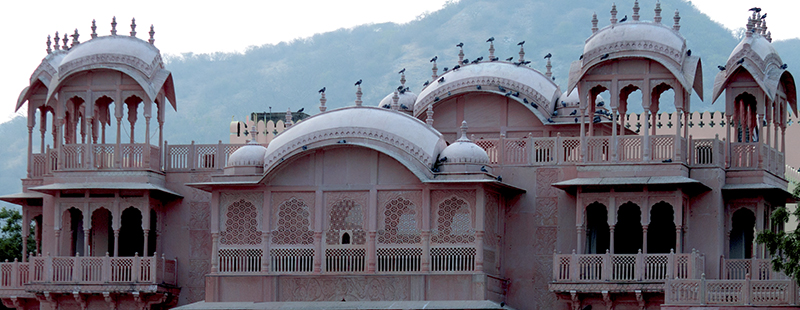
In 1876, the Prince of Wales and Queen Victoria visited India on a tour. Since pink denotes the color of hospitality, Maharaja Ram Singh of Jaipur painted the whole city pink in color to welcome the guests.
After much ado about visa’s and a missed connecting flight, we found ourselves and our bags stuffed randomly into a small car, darting through the tuk tuk, truck, car, bicycle, cow, elephant, goat, and hog filled streets of Jaipur. 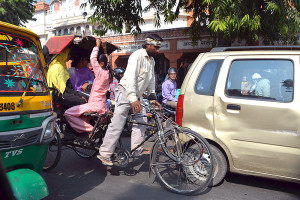 When mentioning my seat belt didn’t seem to work, the driver responded in the rearview mirror “you in back seat, use knee”. Okay. I steadied myself with my right knee, rolled down the window, and began taking pictures, taking in the wafting smell of wood smoke.
When mentioning my seat belt didn’t seem to work, the driver responded in the rearview mirror “you in back seat, use knee”. Okay. I steadied myself with my right knee, rolled down the window, and began taking pictures, taking in the wafting smell of wood smoke.
We were in the heart of Pink City, where we would spend the next week at The Raj Palace, a palace 6 years older than the 300 year old city of Jaipur. I could not help feeling a bit anxious when our driver pulled down an unseemly alley and indicated we had arrived, but once inside the palace walls, there was no doubt we had made the right choice avoiding name brand hotels in the other side of the city. 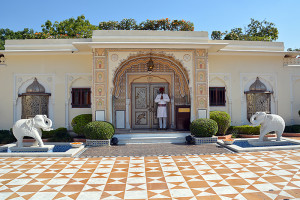 We were warmly welcomed, served a cold drink while our bags were delivered to our room, and completely awed by the palace and grounds. However, we did request a new driver for the week!
We were warmly welcomed, served a cold drink while our bags were delivered to our room, and completely awed by the palace and grounds. However, we did request a new driver for the week!
Our new friend and driver, Vijay, was born and raised in Jaipur, the son of a tailor. He was gracious, kind, and intuitively aware of everything we needed, including a full size van with working belt.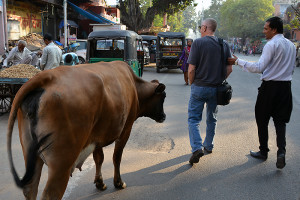
Vijay took us first to see Jal Mahal, the water palace located in the center of Man Sagar Lake. During 1596 AD, there was a severe famine in this region resulting severe water shortage, so the then ruler of Amer had a dam built to store water to overcome the hardships caused by the famine to the people. 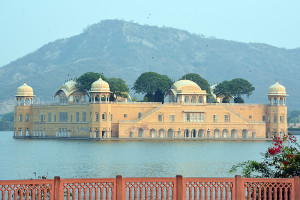 The palace is a five storied red sandstone building, of which four floors remain under water when the lake is full, leaving only the top floor visible. We’re told that the palace being in a lake keeps it cooler for the royal family.
The palace is a five storied red sandstone building, of which four floors remain under water when the lake is full, leaving only the top floor visible. We’re told that the palace being in a lake keeps it cooler for the royal family.
When we returned to the Raj, our room had been prepared for the evening, complete with a tray of fruit and cookies to go with our tea. Slippers placed by the bed and robes hung. 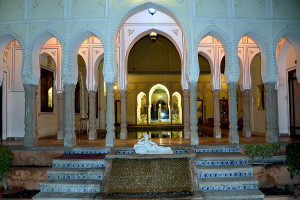 The royal treatment, and seeming even more so having seen only a couple of other guests. It felt as if we had the whole palace and staff to ourselves. The back garden area, pool and veranda are spectacular at night. Everywhere you look, there are artisan details and wondrous whimsical figures, royal paintings, Italian marbles, Egyptian cottons, silks, mahogany trims and Swarovski chandeliers.
The royal treatment, and seeming even more so having seen only a couple of other guests. It felt as if we had the whole palace and staff to ourselves. The back garden area, pool and veranda are spectacular at night. Everywhere you look, there are artisan details and wondrous whimsical figures, royal paintings, Italian marbles, Egyptian cottons, silks, mahogany trims and Swarovski chandeliers.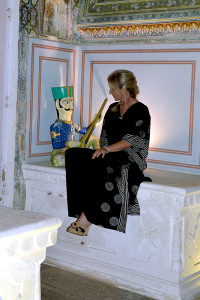
I wanted never to leave.
As soon as I could hear tables being set in the courtyard below our balcony I called down for coffee. It was sunrise, two hours till breakfast service. The birds were singing and monkeys scampered along the wall tops. We had planned the day last evening to have a guide, Rajesh, and Vijay take us to Amber and Jaigarh forts. Vijay was waiting for us in his crisp white shirt, royal black slacks and a warm smile. Rajesh, a young man in grey slacks and shirt, told us historic facts about the Great Wall of India and other monuments as we passed. I was too fascinated with everything to photograph to listen. Vijay smiled in the rear view mirror as we spotted the snake charmer and stopped the van for me.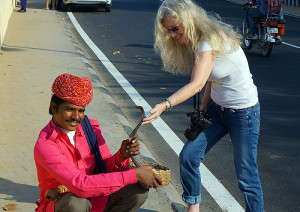
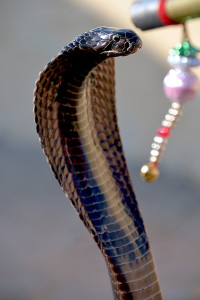 Carlos, the snake, was as soft as a glove and a charming performer. There’s more than one way to make a living, after all, and this little snake and his charmer well earned their tips, as did Lachimi, one of 200 working female elephants on the road to Amber Fort, and her mahout, Papu.
Carlos, the snake, was as soft as a glove and a charming performer. There’s more than one way to make a living, after all, and this little snake and his charmer well earned their tips, as did Lachimi, one of 200 working female elephants on the road to Amber Fort, and her mahout, Papu.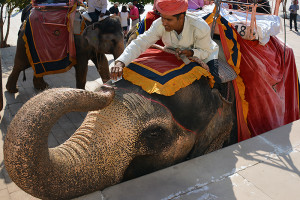
Amber Fort, also known as Amber Palace, is positioned high on a hill about 6 miles outside Jaipur and is the primary tourist attraction. Long lines and lots of people, but well worth the opportunity to see the grandeur of this Hindu style palace within the forts walls. Details tell the stories. 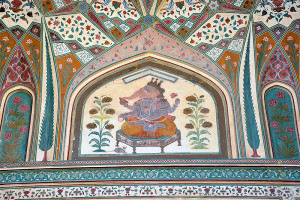 The elephant head God of wisdom and power, Ganesha, said to have been made of the earth and transformed to a boy by Sage. Sage told her new son to guard the door and let no one enter while she bathed. Sage’s husband returned home and demanded to be let in, but Ganesha refused entry and Shiva, outraged, cut off his head. Sage came out and saw with horror what had happened. Shiva swore to restore the boy with another head, and so he did, with an elephant head.
The elephant head God of wisdom and power, Ganesha, said to have been made of the earth and transformed to a boy by Sage. Sage told her new son to guard the door and let no one enter while she bathed. Sage’s husband returned home and demanded to be let in, but Ganesha refused entry and Shiva, outraged, cut off his head. Sage came out and saw with horror what had happened. Shiva swore to restore the boy with another head, and so he did, with an elephant head.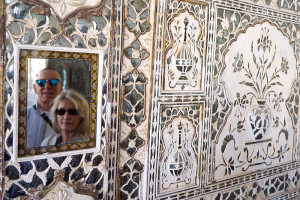
Intricate glass carvings adorn the walls of “Sheesh Mahal”, the glass palace of Amber Fort. A reflection of a memory…
Amber palace and Jaigarh Fort are considered one complex, connected by a subterranean passage, once providing a means of escape for the royal family during times of war.
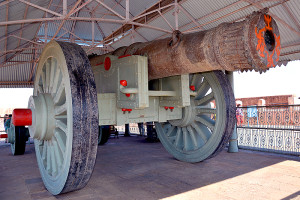
The largest 18th century canon, weighing 50 tons with a 20 foot barrel, sets atop Jaigarh Fort, requiring 4 elephants to swivel it on it’s axis. They say the cannon was fired only once, and that the men who fired it had to jump into a water tank to avoid harm from the recoil. About 220 pounds of gunpowder fired a shot ball weighing 110 pounds.
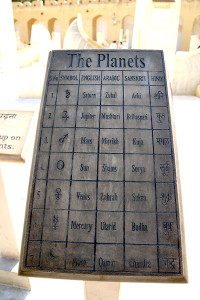
The Jantar Mantar of Jaipur is an observatory built in the first half of the 18th century, by the Rajput king Sawai Jai Singh II…apparently they were very busy in India during this period of time! The observatory houses 19 architectural astronomical instruments that allow the view of astronomical positions with the naked eye, including the worlds largest sundial. Quite impressive astrological calculations made with masonry stone and brass.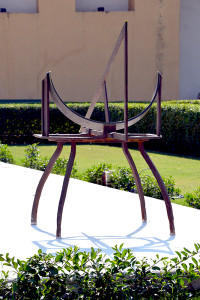
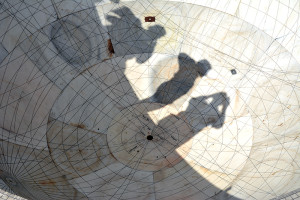
The observatory is located near the City Palace, also built in the 18th century, between 1728 and 1732, by king Sawai Jai Singh II, completed in 1738.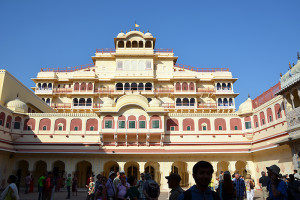 The palace complex is made up of a variety of buildings, museums, temples and the main palace which is still used by descendents of the former rulers of Jaipur. The textile museum did not allow interior photos, but the gift shop sold books, prints and stunning copies of Her Highness’s dresses, jackets and scarfs. The fabrics are embroidered cottons, soft Egyptian cottons and luxurious silks, designed in traditional Indian styles.
The palace complex is made up of a variety of buildings, museums, temples and the main palace which is still used by descendents of the former rulers of Jaipur. The textile museum did not allow interior photos, but the gift shop sold books, prints and stunning copies of Her Highness’s dresses, jackets and scarfs. The fabrics are embroidered cottons, soft Egyptian cottons and luxurious silks, designed in traditional Indian styles.
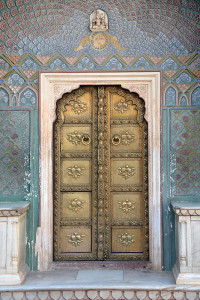
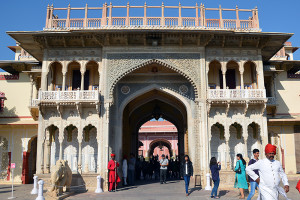 The complex is filled with amazing museums filled with amazing relics from the past, and packed with tourists. It’s been days of monuments and forts and palaces.
The complex is filled with amazing museums filled with amazing relics from the past, and packed with tourists. It’s been days of monuments and forts and palaces.
It’s warm and I’m tired. 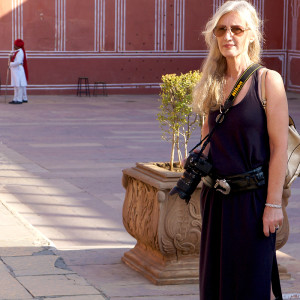 Sometimes, it’s good to stop, relax, and enjoy the atmosphere. There’s only so much history and facts about history that I can absorb. I had reached that point. We left City Palace with our bag of treasure, feeling exhausted to the core. Vijay saw this coming and had brought me a flower from his neighborhood that morning, telling me that I would be completely happy by the next days end. After a couple of drinks and a nice dinner, we called Vijay and told him the remainder of tours were off…we wanted to see his India for the rest of our stay in Jaipur.
Sometimes, it’s good to stop, relax, and enjoy the atmosphere. There’s only so much history and facts about history that I can absorb. I had reached that point. We left City Palace with our bag of treasure, feeling exhausted to the core. Vijay saw this coming and had brought me a flower from his neighborhood that morning, telling me that I would be completely happy by the next days end. After a couple of drinks and a nice dinner, we called Vijay and told him the remainder of tours were off…we wanted to see his India for the rest of our stay in Jaipur.
The next day I woke at sunrise, happy to be feeling no pressure, no schedules, nothing at all in mind to do other than be. No more crowds of tourists to crop out of pictures of things there are already millions of pictures of! I was at ease and looking forward to the day. We had left it entirely in Vijay’s hands, telling him we just wanted to do what he would do with friends and family on days off. After a leisurely morning coffee and breakfast on the balcony, we grabbed our gear and headed down to the courtyard where we could see Vijay had arrived.
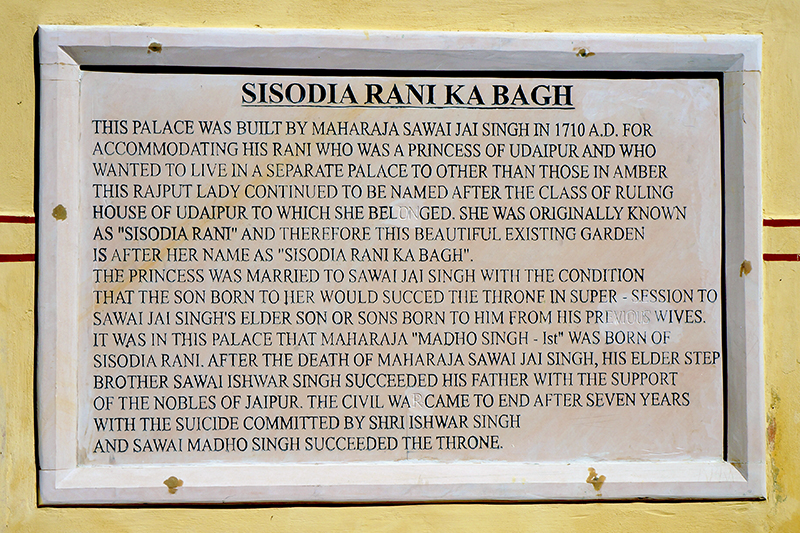
A short drive to Sisodia Rani Ka Bagh Garden, excited to find we were the only visitors there, among three caretakers and one park ranger. It was paradise. There were lush gardens and a palace that has remained unoccupied for over 200 years, donated as a public park.

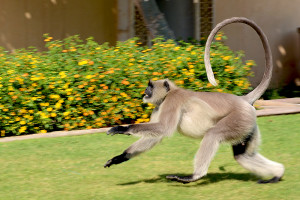
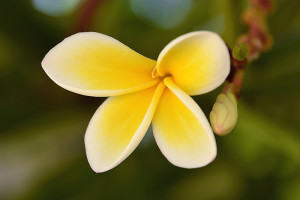
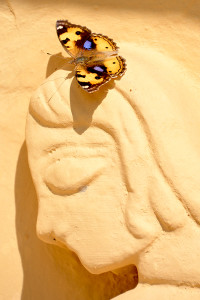 We wandered in solitude, eventually greeted by the helpful park ranger who eagerly pointed out the flora, fauna and insects that resided in the garden. Stephen listened intently while I followed a butterfly through the top terrace of the garden until it showed me where it was intending to rest.
We wandered in solitude, eventually greeted by the helpful park ranger who eagerly pointed out the flora, fauna and insects that resided in the garden. Stephen listened intently while I followed a butterfly through the top terrace of the garden until it showed me where it was intending to rest.
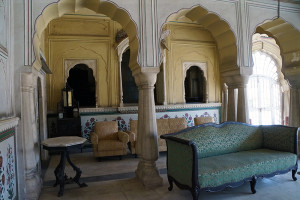 After some time enjoying the peace and solitude, the park ranger waved me his direction and asked if we would like to see the inside of the abandoned Palace, saying since we were alone it would be okay. It felt a bit haunting, seeing furniture and housewares left in place. Even with broken plaster, peeling wall coverings and fading fabrics, it was not difficult to imagine the splendor this palace once portrayed. I think Sisodia must have loved this place very much.
After some time enjoying the peace and solitude, the park ranger waved me his direction and asked if we would like to see the inside of the abandoned Palace, saying since we were alone it would be okay. It felt a bit haunting, seeing furniture and housewares left in place. Even with broken plaster, peeling wall coverings and fading fabrics, it was not difficult to imagine the splendor this palace once portrayed. I think Sisodia must have loved this place very much.
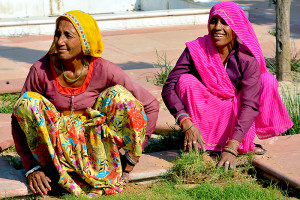
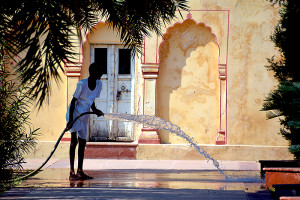
Galtaji Monkey Temple is difficult to put into words, but magnificent in imagery! 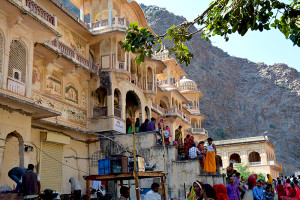 This ancient Hindu pilgrimage site is located about 6 miles outside Jaipur. The magnificent sandstone temple, also built by Sawai Jai Singh II in the 18th century, commands the complex encompassing 7 holy kunds (water pools), the holiest of which is Galta Kund, said to never run dry, and fed by natural springs from the Gaumukh, a rock shaped like a cow’s head. It is said that Saint Galav spent his whole life in search of truth in this holy place, and for his good work, the Gods blessed the waters never to run dry and have strong healing powers. It’s been weeks since our visit and it continues to linger in my dreams each night, walking the stone paths and swimming in the Galta Kund by torch light.
This ancient Hindu pilgrimage site is located about 6 miles outside Jaipur. The magnificent sandstone temple, also built by Sawai Jai Singh II in the 18th century, commands the complex encompassing 7 holy kunds (water pools), the holiest of which is Galta Kund, said to never run dry, and fed by natural springs from the Gaumukh, a rock shaped like a cow’s head. It is said that Saint Galav spent his whole life in search of truth in this holy place, and for his good work, the Gods blessed the waters never to run dry and have strong healing powers. It’s been weeks since our visit and it continues to linger in my dreams each night, walking the stone paths and swimming in the Galta Kund by torch light.
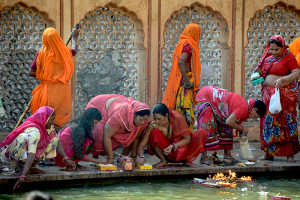
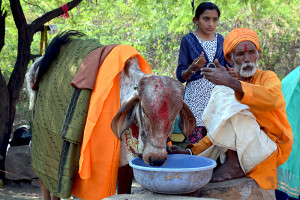
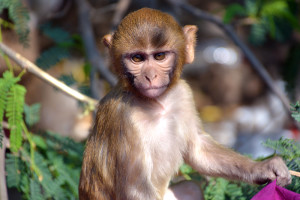 .
. 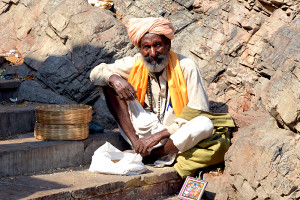
“My story being done,
She gave me for my pains a world of sighs;
She swore, in faith ’twas strange, ’twas passing strange;
‘Twas pitiful. ‘Twas wondrous pitiful,
She wish’d she had not heard it, yet she wish’d…”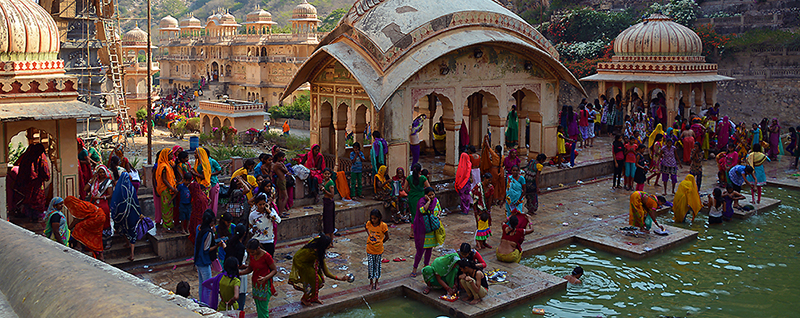
My head was so full of vivid colorful imagery and excitement on the drive back to town that I nearly forgot where we were going. Vijay parked the van and we began walking the streets of his neighborhood. 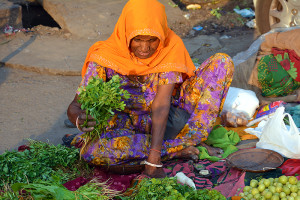 It was dusk and the streets were full of people doing business as usual and shopping for their evening meals. I found a spot to sit on a roundabout planter, just watching all the traffic and activity. It was overwhelming to see it all happening so fast to and from every direction in every form imaginable.
It was dusk and the streets were full of people doing business as usual and shopping for their evening meals. I found a spot to sit on a roundabout planter, just watching all the traffic and activity. It was overwhelming to see it all happening so fast to and from every direction in every form imaginable.
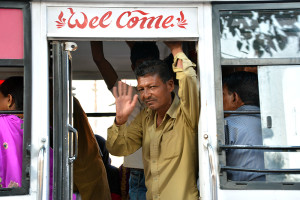
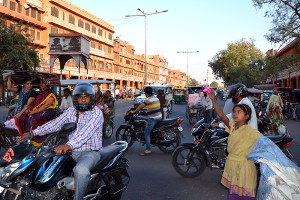
We turned down a tiny alley way, navigating between bikes, cows and people, turning left, then right into smaller and smaller passageways until we came to Vijay’s mothers house. She stood smiling in her brightly colored saree, indicating which direction we should go. We sat on the foot of the neatly made up bed in her blue room. There were pictures of her children and grandchildren all around the room. Vijay sat opposite us in a chair. After some translated conversation about all the pictures, Amma gestured me to follow her. 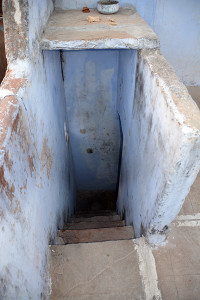 We climbed surprisingly narrow and steep stairs to the rooftop where her kitchen room stood, door open, with Vijay’s sister inside cooking.
We climbed surprisingly narrow and steep stairs to the rooftop where her kitchen room stood, door open, with Vijay’s sister inside cooking.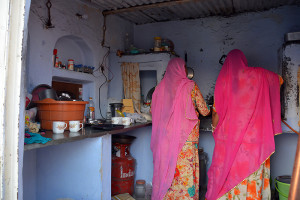 It was a spectacular view. We couldn’t really converse, them not speaking English and me not Speaking Hindi, but it was all good. Amma pointed to a chair and brought me water.
It was a spectacular view. We couldn’t really converse, them not speaking English and me not Speaking Hindi, but it was all good. Amma pointed to a chair and brought me water.
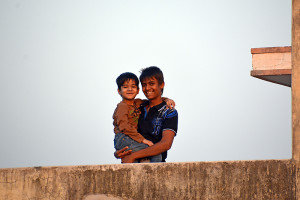
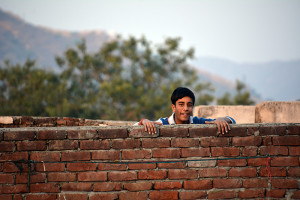 Then I saw kites! As I began to focus the lens on the kites, a head popped up, waving from several buildings over. I waved back and took his picture. Then another head popped up, waving and wanting a picture. Then the first came back with his little brother for a picture while the second jumped up on the wall for a full frame shot. “America?” “Yes!” “America, America! Over here!”…from another group of children with their mother, flying kites from their rooftop. The whole neighborhood was greeting me with smiles and waves! Vijay came up to warn me not to get too close to the red faced monkeys and helped his mother back downstairs with the tray of tea and nuts.
Then I saw kites! As I began to focus the lens on the kites, a head popped up, waving from several buildings over. I waved back and took his picture. Then another head popped up, waving and wanting a picture. Then the first came back with his little brother for a picture while the second jumped up on the wall for a full frame shot. “America?” “Yes!” “America, America! Over here!”…from another group of children with their mother, flying kites from their rooftop. The whole neighborhood was greeting me with smiles and waves! Vijay came up to warn me not to get too close to the red faced monkeys and helped his mother back downstairs with the tray of tea and nuts.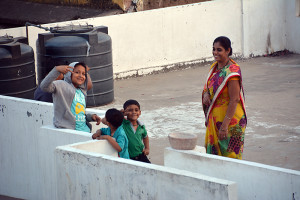
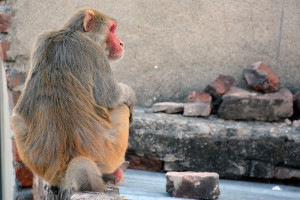
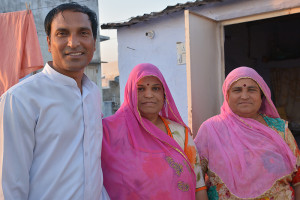
It was the best evening so far. Vijay was right, today I was completely happy.
As we made our way back through the neighborhood to where the van was parked, things looked different in the evening light. I knew I would miss our new friend and his India. They say that it will be okay in the end, and if it’s not okay, it’s not the end!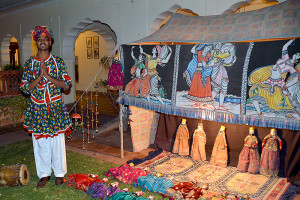
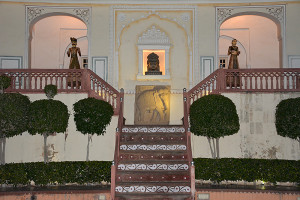 Meanwhile, back at the Raj Palace, a puppet show was about to begin. We got our drinks and sat down to watch, still the only guests in sight. It was a perfect end to a perfect day.
Meanwhile, back at the Raj Palace, a puppet show was about to begin. We got our drinks and sat down to watch, still the only guests in sight. It was a perfect end to a perfect day.
Our last day was spent relaxing , enjoying the Raj Palace amenities, walking around the surrounding neighborhood and preparing for the next days long drive south to Khem Villas at Ranthambore National Park, tiger reserve.
We were very excited to be traveling to the Tiger Reserve, but very sad to be leaving The Raj Palace and Jaipur. On our last morning, the staff carefully looked after all of our needs, sending us off in true Raj Palace style!
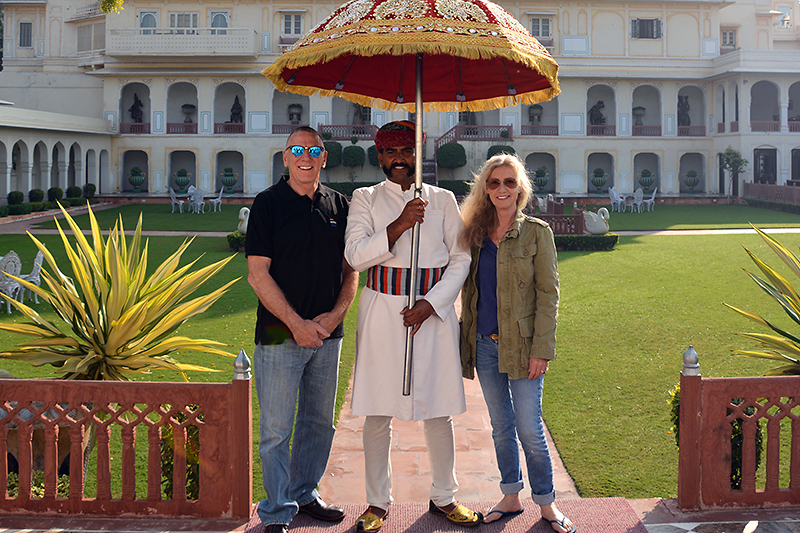
Visit the following links for Jaipur photo slideshows!
Bagh Garden and Monkey Temple Slideshow
People of Jaipur and The Raj Palace
